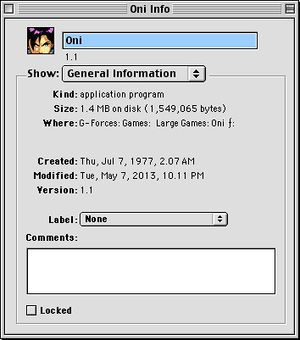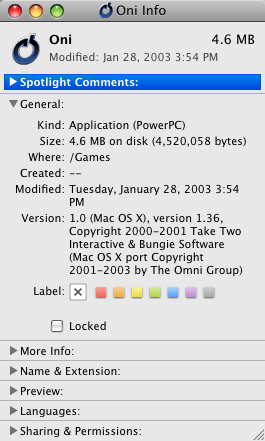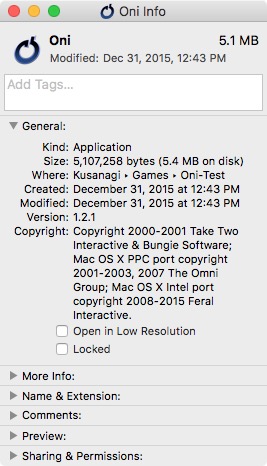History of Mac Oni: Difference between revisions
(mentioning PC demo based off Mac code, wording) |
m (using hatnote template; also linking to "European Mac releases") |
||
| (34 intermediate revisions by 2 users not shown) | |||
| Line 1: | Line 1: | ||
{{Hatnote|For the overall history of Oni's development, see [[Oni]]. For information on the unusual European Mac releases with extra files, see [[European Mac releases|HERE]].}} | |||
Unlike Oni for Windows, which wasn't updated or patched by the developer after its release, the Mac version of Oni has a complicated history due to changes in the Mac platform, and has evolved throughout the years. | |||
__NOTOC__ | __NOTOC__ | ||
==Windows 1.0 to Mac 1.1== | ==Windows Oni 1.0 to Mac Oni 1.1== | ||
While Oni was developed by [[Bungie West]] simultaneously for Windows and Mac OS (with the | [[Image:Classic Mac Oni Get Info window.jpg|thumb|Bungie's original Carbon PPC build of Oni 1.1.]] | ||
While Oni was developed by [[Bungie West]] simultaneously for Windows and Mac OS (with the PlayStation 2 port being done in parallel by Rockstar), the game's development was not completed for both platforms at the same time. The date of the retail Windows application is 11/3/00, the game data is dated 11/4/00, and Oni was reported as having been [[wp:Software release life cycle#Release to manufacturing (RTM)|gold-mastered]] for Windows [http://oni.bungie.org/newsarchives/2000/nov00.html#xbox around 11/17/2000]. Although the date on the Mac game data is 11/20/00, the Mac version continued in development for another month, partly due to a graphics bug discovered [http://carnage.bungie.org/oniforum/oni.forum.pl?read=7653 at the last minute]. It was probably gold-mastered on 12/20/00 based on the date on the demo application (which doesn't have the joke creation date seen to the right), and based on [http://carnage.bungie.org/oniforum/oni.forum.pl?read=8045 this post] by Matt Soell. (There's a report of a [http://oni.bungie.org/newsarchives/2001/jan01.html#gold late Mac GM date of 1/2/01], but this doesn't make sense unless the code underwent further last-minute changes after the demo.) | |||
It appears that the Mac version of Oni required a change to the layout of the game data files (the addition of .sep files; see [[Windows Oni vs. Mac Oni#Game data files|HERE]] for details). The required changes to Oni's code were made after the final build of the retail Windows Oni application, but because the Windows demo was not released until [http://oni.bungie.org/newsarchives/2000/dec00.html around 12/17/00], it was built on the version of the code which used .sep files. | |||
As a result of reaching gold status first, the Windows retail Oni application is labeled as version 1.0 (as seen in the [[Oni (folder)/readme.txt|Windows read-me]]), and Bungie's build of the game app for the Mac is version 1.1 (pictured, right; also see the [[Oni (folder)/Oni ReadMe|Mac read-me]]). Besides any fixes to the code made after Windows Oni was gold-mastered, it's likely that additional bugs were fixed between the production of the Windows demo and the Mac release, based on issues observed in BSL in the Windows demo application that aren't present in Mac Oni. | |||
However, the release of Mac OS X in spring 2001 was awkward timing for Oni. The best that Bungie could do for compatibility before Oni released in January 2001 was to build the Oni application as a "Carbon" application that was compatible with developer previews of OS X. Carbon apps could be written primarily for OS 9 and still run in OS X. Unfortunately, when OS X released, the Carbon build of Oni displayed various issues in that environment. | |||
{| | |||
|valign=top| | |||
==Carbon to Cocoa== | ==Carbon to Cocoa== | ||
Then, at the end of 2001, | [[Image:Omni Oni Get Info window.png|thumb|The Omni Group's PPC Mac OS X port.]] | ||
Then, at the end of 2001, The Omni Group [http://www.omnigroup.com/mailman/archive/omni-press/2001/000008.html released] a "Cocoa" (native OS X) build of the game which they had produced for free. This became known as the Omni build (now often referred to as the PPC build to differentiate it from the later Intel build). Their OS X builds (released through 2003) kept Oni stable on the latest Mac OS for several years. The last Omni build is still available [http://files.omnigroup.com/software/MacOSX/10.1/Oni-1.0v1.36.dmg here]. However, as computers advanced, a critical bug appeared in both Windows and Mac Oni: the game would immediately crash while querying the graphics card at startup. Once a patch, made through hex editing, was figured out in Windows, it was carried over to the PPC build. Over time, additional patches were made by fans to the PPC build; see [[OMNI|HERE]] for details. | |||
| | |||
==PPC to Intel== | ==PPC to Intel== | ||
[[Image:Feral Oni Get Info window.jpg|thumb|Feral's most recent Intel Mac build.]] | |||
In 2006 Apple began the [[wp:Mac transition to Intel processors|switch to Intel processors]], moving away from the PowerPC chip for which both Bungie and The Omni Group had built Oni. For a while, PPC apps could be run on Intel Macs using [[wp:Rosetta (software)|Rosetta]], but support for the old architecture was expected to eventually phase out. In 2009, [https://www.feralinteractive.com/en/ Feral Interactive] (Oni's Mac distributor outside of North America) [http://oni.bungie.org/forum/viewtopic.php?id=848 expressed an interest] in putting out an Intel-native build of Oni. They obtained the latest version of Oni's source code from The Omni Group (who had already begun porting it to Intel), and made their initial public release of Oni for Intel Macs in the spring of 2011, a few months before the first version of OS X without Rosetta was released. The Feral build of Oni incorporates a number of changes requested by fans, detailed [[FERAL|HERE]]. | |||
|} | |||
[[Category:Oni history]] | [[Category:Oni history]] | ||
Latest revision as of 03:52, 10 December 2022
- For the overall history of Oni's development, see Oni. For information on the unusual European Mac releases with extra files, see HERE.
Unlike Oni for Windows, which wasn't updated or patched by the developer after its release, the Mac version of Oni has a complicated history due to changes in the Mac platform, and has evolved throughout the years.
Windows Oni 1.0 to Mac Oni 1.1
While Oni was developed by Bungie West simultaneously for Windows and Mac OS (with the PlayStation 2 port being done in parallel by Rockstar), the game's development was not completed for both platforms at the same time. The date of the retail Windows application is 11/3/00, the game data is dated 11/4/00, and Oni was reported as having been gold-mastered for Windows around 11/17/2000. Although the date on the Mac game data is 11/20/00, the Mac version continued in development for another month, partly due to a graphics bug discovered at the last minute. It was probably gold-mastered on 12/20/00 based on the date on the demo application (which doesn't have the joke creation date seen to the right), and based on this post by Matt Soell. (There's a report of a late Mac GM date of 1/2/01, but this doesn't make sense unless the code underwent further last-minute changes after the demo.)
It appears that the Mac version of Oni required a change to the layout of the game data files (the addition of .sep files; see HERE for details). The required changes to Oni's code were made after the final build of the retail Windows Oni application, but because the Windows demo was not released until around 12/17/00, it was built on the version of the code which used .sep files.
As a result of reaching gold status first, the Windows retail Oni application is labeled as version 1.0 (as seen in the Windows read-me), and Bungie's build of the game app for the Mac is version 1.1 (pictured, right; also see the Mac read-me). Besides any fixes to the code made after Windows Oni was gold-mastered, it's likely that additional bugs were fixed between the production of the Windows demo and the Mac release, based on issues observed in BSL in the Windows demo application that aren't present in Mac Oni.
However, the release of Mac OS X in spring 2001 was awkward timing for Oni. The best that Bungie could do for compatibility before Oni released in January 2001 was to build the Oni application as a "Carbon" application that was compatible with developer previews of OS X. Carbon apps could be written primarily for OS 9 and still run in OS X. Unfortunately, when OS X released, the Carbon build of Oni displayed various issues in that environment.
Carbon to CocoaThen, at the end of 2001, The Omni Group released a "Cocoa" (native OS X) build of the game which they had produced for free. This became known as the Omni build (now often referred to as the PPC build to differentiate it from the later Intel build). Their OS X builds (released through 2003) kept Oni stable on the latest Mac OS for several years. The last Omni build is still available here. However, as computers advanced, a critical bug appeared in both Windows and Mac Oni: the game would immediately crash while querying the graphics card at startup. Once a patch, made through hex editing, was figured out in Windows, it was carried over to the PPC build. Over time, additional patches were made by fans to the PPC build; see HERE for details. |
PPC to IntelIn 2006 Apple began the switch to Intel processors, moving away from the PowerPC chip for which both Bungie and The Omni Group had built Oni. For a while, PPC apps could be run on Intel Macs using Rosetta, but support for the old architecture was expected to eventually phase out. In 2009, Feral Interactive (Oni's Mac distributor outside of North America) expressed an interest in putting out an Intel-native build of Oni. They obtained the latest version of Oni's source code from The Omni Group (who had already begun porting it to Intel), and made their initial public release of Oni for Intel Macs in the spring of 2011, a few months before the first version of OS X without Rosetta was released. The Feral build of Oni incorporates a number of changes requested by fans, detailed HERE. |


